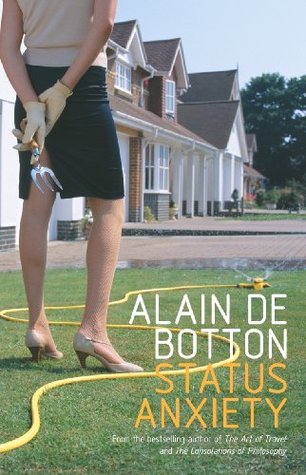More on this book
Community
Kindle Notes & Highlights
Belittling others is no pastime for those convinced of their own standing. There is terror behind haughtiness. It takes a punishing impression of our own inferiority to leave others feeling that they aren’t good enough for us.
We envy only those whom we feel ourselves to be like; we envy only members of our reference group. There are few successes more unendurable than those of our close friends.
at things; we are humiliated only if we first invest our pride and sense of worth in a given achievement, and then do not reach it.
Rousseau’s argument hung on a thesis about wealth: that wealth does not involve having many things. It involves having what we long for. Wealth is not an absolute. It is relative to desire. Every time we seek something we cannot afford, we grow poorer, whatever our resources. And every time we feel satisfied with what we have, we can be
Social Darwinists proposed that all humans began by facing a fair struggle over scarce resources: money, jobs, esteem. Some gained the upper hand in this contest, not because of improper advantages or luck but because they were intrinsically better than those they outpaced. The rich were not better from a moral point of view. They were, intimidatingly, naturally better. They
But product life cycles have sharply accelerated since the middle of the nineteenth century – destroying workers’ confidence in the long-term integrity of their careers.
‘The bourgeoisie has … pitilessly torn asunder the motley feudal ties that bound man to his “natural superiors” and has left remaining no other nexus between man and man than naked self-interest, than callous “cash payment”. It has drowned the most heavenly ecstasies of religious fervour, of chivalrous enthusiasm, of philistine sentimentalism, in the icy water of egotistical calculation. It has resolved personal worth into exchange value.’
We may feel envy about a condition or possession that would make us unhappy if we secured it. And we may experience ambitions unconnected to our real needs. Left to their own devices, our emotions are as likely to push us towards indulgence, uncontrolled anger and self-destruction as towards health and virtue.
Or, as Schopenhauer put the question, ‘Would a musician feel flattered by the loud applause of his audience if it were known to him that, with the exception of one or two, it consisted entirely of deaf people?’
What matters is not what we seem to a random group, but what we know we are.
Art, said Arnold, is ‘the criticism of life’.
‘If art does not enlarge men’s sympathies, it does nothing morally,’
The category of the successful person comprises both men and women, of any race, who have been able to accumulate money, power and renown through their own activities (rather than through inheritance) in one of the myriad branches of the commercial world (including sport, art and scientific research). Because societies are practically trusted to be ‘meritocratic’, financial achievements are understood to be ‘deserved’. The ability to accumulate wealth is prized for reflecting the presence of at least four cardinal virtues: creativity, courage, intelligence and stamina. The presence of other
...more
A man may have a great suite of attendants, a beautiful palace, great influence and a large income. All that may surround him, but it is not in him … Measure his height with his stilts off: let him lay aside his wealth and his decorations and show himself to us naked … What sort of soul does he have? Is his soul a beautiful one, able, happily endowed with all her functions? Are her riches her own or are they borrowed? Has luck had nothing to do with it? … That is what we need to know; that is what
however independent-minded we might judge ourselves to be, we are dangerously poor at understanding our own needs. Our souls rarely articulate what they must have in order to be satisfied, or, when they do mumble something, their commands are likely to be misfounded or contradictory. Rather than comparing the mind with a body correct in its sense of what it should consume in order to be healthy, Rousseau invited us to think of it as being more like a body that cries out for wine when it needs water and insists it should be dancing when it should in truth be flat on a bed. Our minds are
...more
This highlight has been truncated due to consecutive passage length restrictions.
Life seems a process of replacing one anxiety with another and substituting one desire for another – which is not to say that we should never strive to overcome any anxieties or fulfil any desires, but that we should perhaps build into our strivings an awareness of the way our goals promise us levels of rest and resolution that they cannot, by definition, deliver.
John Ruskin
Unto This Last, he therefore entreated us to set aside our ordinary monetary conceptions of wealth in order to take up a ‘life’-based view, according to which the wealthiest people in the land would no longer automatically be the merchants and the landowners, but those who most keenly felt wonder beneath the stars at night or were best able to interpret and alleviate the sufferings of others. ‘There is no wealth but life,’ he intoned: ‘life, including all its powers of love, of joy and of admiration. That country is richest which nourishes the greatest number of noble and happy human beings;
...more


